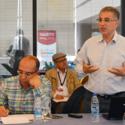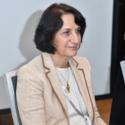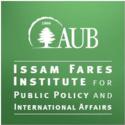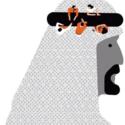
- الرئيسية
- عن المجلس
-
منح أبحاث وزمالة
- البرامج الحالية
- برنامج المنَح التعاونية للباحثين <<
- موارد مهمّة لأصحاب/صاحبات المنح والزملاء
- مشغل النماذج الفكرية الجديدة <<
-
برنامج المنح البحثية <<
- وصف البرنامج
- دعوة لتقديم المقترحات الدورة العاشرة
- الدورة الأولى لبرنامج المنح البحثية
- الدورة الثانية لبرنامج المنح البحثية
- الدورة الثالثة لبرنامج المنح البحثية
- الدورة الرابعة لبرنامج المنح البحثية
- الدورة الخامسة لبرنامج المنح البحثية
- الدورة السادسة لبرنامج المنح البحثية
- الدورة السابعة لبرنامج المنح البحثية
- الدورة الثامنة من برنامج المنح البحثية
- الدورة التاسعة من برنامج المنح البحثية
-
برنامج مجموعات العمل <<
- وصف البرنامج
- أكاديمية المجلس العربي للعلوم الاجتماعية 2021
- أكاديمية المجلس العربي للعلوم الاجتماعية 2024
- إنتاج المجال العالم
- مجموعة العمل حول الإثنوغرافيا والمعرفة في المنطقة العربية
- بودكاست
- الحلقة الأولى
- الحلقة الثانية
- الحلقة الثالثة
- مذكرات اثنوغرافية بودكاست
- الدراسات النقدية للأمن
- دعوة إلى الباحثات
- المعهد الصيفي الخامس-دعوة لتقديم الطلبات
- دعوة لتقديم الطلبات: الحدود والدولة في ضوء كوفيد-19
- الممارسات النقدية
- الإقليميات الجديدة
- دعوة إلى تقديم الطلبات
-
برنامج الزملاء الناشئين <<
- لمحة عن برنامج الزملاء الناشئين
- دعوة الى تقديم الطلبات-برنامج الزملاء الناشئين/الدورة الحادية عشرة
- أصحاب زمالات ما بعد الدكتوراه (2015-2017)
- أصحاب زمالات ما بعد الدكتوراه (2017-2018)
- الزملاء الناشئون (2018-2019)
- الزملاء الناشئون (2019-2020)
- الزملاء الناشئون (2020-2021)
- الزملاء الناشئون (2021-2022)
- الزملاء الناشئون (2022-2023)
- الزملاء الناشئون (2023-2024)
- برنامج المنح الصغيرة <<
- برنامج زمالات ما بعد الدكتوراه للتنقل <<
- برنامج البحوث حول الفنون <<
- زمالة باسم شيت لدراسة النشاطية <<
- برنامج زمالات الجيل الجديد <<
- المرصد
- المشاريع المشتركة
- النشاطات
- إصدارات
- العضويّة
- للاتصال بنا
المنتدى
Posts categorized as: المنتديات والمناقشات
Third Critical Security Studies Summer Institute Hosts 20 Researchers in Lebanon
07/02/2019
For the third consecutive year, the ACSS Working Group, the Beirut Critical Security Studies Collective (BCSSC), organized a Summer Institute on Critical Security Studies in the Arab region for junior researchers working on issues of (in)security in the Arab region.
صدور كتاب جديد يهدف إلى فهم الزمانية والعامنية العربية عبر مقاربة الحياة اليومية
05/22/2019بمناسبة صدور الكتاب "الثقافة والزمن والجماهير في العالم العربي: الإعلام والمجال العام والزمانية"، أجرينا مقابلة مع المحرّرَين طارق صبري وجو خليل عبر البريد الإلكتروني للتعرّف أكثر إلى الكتاب وأهدافه.
New Book Aims to Make Sense of Arab Temporality and Publicness Using an Everyday Life Approach
05/22/2019We talk to Tarik Sabry and Joe Khalil, editors of the new collection "Culture, Time and Publics in the Arab World: Media, Public Space and Temporality."
منهجيات الأرشيف البديلة: الأرشيف النسوي نموذجًا
03/15/2019
عقدت في 14-15 ديسمبر 2018 مجموعة العمل حول الممارسات النقدية التابعة للمجلس العربي للعلوم الإجتماعية "ملتقى الممارسات الأرشيفية البديلة" في بيروت. وفي سبيل توسيع النقاش ومشاركة الأفكار التي عرضت في خلال الملتقى مع شريحة أوسع من الناس، ننشر في ما يلي مداخلة الدكتورة هدى الصدة بعنوان "منهجيات الأرشيف البديلة: الأرشيف النسويّ نموذجًا" في خلال هذا المنتدى. الصدى هي إحدى مؤسسي مؤسسة المرأة والذاكرة، وترأس حاليًّا مجلس أمناء المؤسسة.
Call for Abstracts: Workshop on Ethnography, Religion and Traveling Critique Between Europe and MENA
01/29/2019
The workshop invites scholars to reflect, on the basis of ethnographic fieldwork, on how critique travels across religious and geographic difference.
Highlights from Day 2 of the Forum on Alternative Archival Practices
12/17/2018The ACSS Working Group, Critiques of Power, organized on December 14-15, 2018 the Forum on Alternative Archival Practices at Antwork, Beirut. Here are some highlights from Day 2 of the event.
Highlights from Day 1 of the Forum on Alternative Archival Practices
12/17/2018The ACSS Working Group, Critiques of Power, organized on December 14-15, 2018 the Forum on Alternative Archival Practices at Antwork, Beirut. Here are some highlights from Day 2 of the event.
Highlights from the 2nd Summer Institute on Criticial Security Studies in the Arab Region
07/04/2018The ACSS Working Group, the Beirut Security Studies Collective, organized the 2nd Summer Institute on Critical Security Studies in the Arab Region on June 21-26, 2018 in Broummana, Lebanon. Here are some highlights from event.
بوابة الأثر الإجتماعي: محاولة لوضع نتائج البحث العلمي في متناول الجميع
06/26/2018
مقابلة مع ساري حنفي: مؤسس ومدير مشروع البوابة الإلكترونية حول الأثر الإجتماعي للبحث العلمي
Highlights from the Third ACSS Research Forum
04/12/2018The ACSS held its Third Research Forum on April 4-7, 2018 in Amman, Jordan. Here we look back on some of the major moments of the 4-day event, which brings together ACSS grantees, fellows and trustees and selection committee members.
Roundup of Social Science Calls for the Arab Region - Jan 11, 2018
01/11/2018Roundup of open calls focused on the social sciences in the Arab region - January 11, 2018
"النِسْوية الإسلامية" لا استشراقية ولا استغرابية
10/10/2017
ننشر في ما يلي مداخلة الدكتورة حُسن عبود حول النسوية الإسلامية التي قدمتها خلال طاولة مستديرة بعنوان "السرديات النسوية في الواقع العربي بين الاستشراق الحديث والاستغراب المستحدث".
العنف ضد النساء في العالم العربي والسردية النسوية المناهضة للاستعمار
09/29/2017
ننشر في ما يلي مداخلة الدكتورة هدى الصدة حول العنف ضد النساء في العالم العربي والسردية النسوية المناهضة للاستعمار التي قدمتها خلال طاولة مستديرة بعنوان "السرديات النسوية في الواقع العربي بين الاستشراق الحديث والاستغراب المستحدث".
Call for Proposals: 2018 APSA MENA Workshop Leaders
09/25/2017The American Political Science Association (APSA) is pleased to announce a call for proposals from political scientists interested in serving as co-leaders for the 5th annual MENA Workshop program.
Gaps and Omissions in Arab Social Sciences: A Talk by ACSS Director-General
09/12/2017In June 2017, the Director-General of the Arab Council for the Social Sciences (ACSS), Seteney Shami, gave a talk titled "The Social Sciences in the Arab Region: Gaps, Elisions and Glosses" at the Central European University (CEU) in Budapest.
كيفية مقاربة موضوع الأمن في العالم العربي بطريقة نقدية
09/11/2017
تقرير حول الطاولة المستديرة بعنوان "الدراسات النقدية حول الأمن في العالم العربي" التي عقدت ضمن فعاليات المؤتمر الثالث للمجلس العربي للعلوم الاجتماعية الذي نظّم في آذار 2017.
المجلس العربي للعلوم الاجتماعية ينشر بعض أهم نتائج التقرير الأول للمرصد العربي للعلوم الاجتماعية
07/28/2016
صدر عن المرصد العربي للعلوم الاجتماعية، أحد أهم مشاريع المجلس العربي للعلوم الاجتماعية، تقرير بعنوان "العلوم الاجتماعية في العالم العربي: أشكال الحضور". سنقوم على مدار الأيام المقبلة بنشر بعض أهم نتائج التقرير على صفحتنا على فايسبوك وتويتر.
Declaration of the 3rd World Social Science Forum | 16 September 2015
09/21/2015Hosted in Durban, South Africa, the World Social Science Forum 2015 took place against the backdrop of multiple transitions that affect global governance, resource utilization, social relations and quality of life leading to increased global inequalities.
Plenary: Theorizing Inequality and Difference through a Regional Lens
09/03/2015The monthly audio journal, Status, featured the keynote plenary from our Second Conference on Questioning Social Inequality and Difference in the Arab Region in its panel section.
Virtual Roundtable of the Arab Council for the Social Sciences
02/26/2015Who Are the People? A Conversation on the Assemblages and the Archives of the People
Keynote Speech by Dr. Hassan Rachik on ‘’Open and Closed Collective Identities’’ - The ACSS Research Forum
09/29/2014كلمة للدكتور حسن رشيق بعنوان : أدلجة الهويات الإجتماعية
"الدولة الغنائمية و الربيع العربي"
09/05/2014
يسرّمعهد عصام فارس للسياسات العامة والعلاقات الدولية في الجامعة الأميركية في بيروت وشبكة المنظمات العربية غير الحكومية للتنمية بدعوتكم للمشاركة في ندوة حوارية لمناقشة و إطلاق كتاب الأستاذ أديب نعمة
Syria in Fragments: The Politics of the Refugee Crisis
01/30/2014
Throughout 2013 António Guterres, the United Nations High Commissioner for Refugees, seemed to be running out of ways to sound the alarm and describe the magnitude of the Syrian refugee crisis. “Syria as a civilization is unraveling,” he declared in early June. Later that month he stated that it was the worst catastrophe since the end of the Cold War. The numbers bear out his claims. By the end of 2013 there were over 2 million registered refugees, several million others internally displaced, and estimates of 10 million in desperate need of food and shelter, out of a total population of around 23 million. An estimated 100,000 have been killed by the fighting and many more wounded and disappeared.
A New Brain Trust For The Middle East
10/07/2013
In any American university, what the six researchers in this room are doing would be totally unremarkable: launching a new project to use the tools of social science to solve urgent problems in their home countries. But for the young Arab Council for the Social Sciences, this work is anything but routine. The group’s fall meeting, initially planned for Cairo, was canceled at the last minute when Egyptian state security agents demanded a list of participants and research questions. The group relocated its meeting to Beirut, meaning some researchers couldn’t come because of visa problems. Still others feared traveling to Lebanon during a week when the United States was considering air strikes against neighboring Syria. Ultimately, the team met in an out-of-the-way hotel, with one participant joining via Skype.
التصنيفات
العناوين الرئسية
إذا كنتم ترغبون في الانتساب إلى المجلس العربي للعلوم الاجتماعية، يمكنكم مراجعة صفحة العضوية للاطلاع على أنواع العضوية وكيفية تقديم طلب الانتساب.
المشاركات الأخيرة
- ACSS Conference on Safeguarding Knowledge Production in the Arab Region
- مؤتمر للمجلس حول صون إنتاج المعرفة في المنطقة العربيّة
- Launch of the Fourth Arab Social Science Report at Northwestern Qatar
- الأرشيف الخاص للنساء في مصر: إعادة قراءة السرديات السائدة
- ورشتَين تدريبيّتَين للمجلس حول "إدارة بيانات العلوم الاجتماعية البحثية"
حقوق النشر © 2024
المجلس العربى للعلوم الاجتماعية
سياسة الخصوصية
شروط الخدمة
المجلس العربى للعلوم الاجتماعية
بناية علم الدين، الطابق الثاني
شارع جون كندي، رأس بيروت
بيروت – لبنان
هاتف :214 370 1 961
فاكس :215 370 1 961
بريد الكترونى: admin@theacss.org